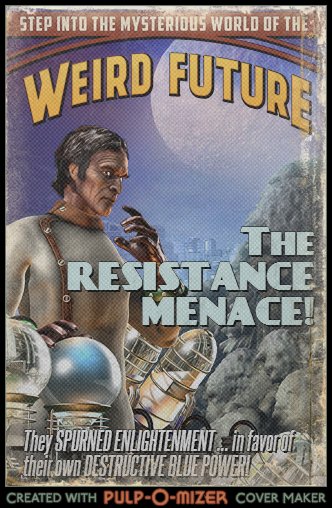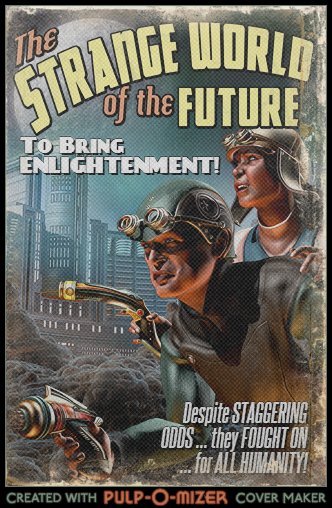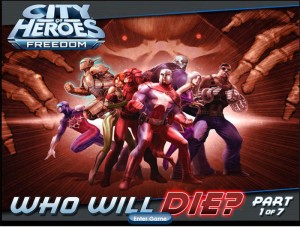Whoa. MMORPG + Sociology = Teh Weird.
Loyola media professor David Myers tells the tale (as an academic paper) of what happens when you flout social rules, even if you are perfectly legal (and even supported by the codified moral laws) in doing so. The answer: you become very, very unpopular.
What makes this interesting is that Myers is writing about an experiment he ran himself in CoX, using a veteran toon named “Twixt,” both in its original incarnation on Champions (where it was a long-time character), and rebuilt on Infinity and Freedom. In each case, he managed to get driven out of groups; DOSsed from his chat channel; subjected to disparagement of his intellect, experience, and morals; hunted down by collective teams of heroes and villains; and personally threatened.
All for being a super-hero. As opposed to being a social hero.
Twixt’s activities were run in Recluse’s Victory. His basic sin was doing whatever he could to support the heroic side of the endeavor, regardless of whether it made people happy. His specific and most egregious “breaching” offenses, according to Myers:
- Teleport Other of villains into security drones (“droning”) or NPC heroes.
- Attacking of villains who were “collaborating” with heroes to farm NPCs in the zone with Heavies.
- Declining to team with others (which turned into refusing to do so when too many teams turned into traps by players colluding with each other).
None of these behaviors was illegal. In fact, the Devs never acted on the many petitions lodged against Twixt, In their own way, these actions, esp. the first two, were perfectly keeping with the milieu of heroes vs. villains, much more than many of the folks condemning Twixt’s actions were. Worse, Twixt was very successful at what he was doing, Myers notes
Myers’ conclusions are that social rules are not necessarily constructed based on natural rules (Myers couches this all in various sociological terms such as social constructionist theory, ethnomethodology, positivism, etc., but that’s what it boils down to).
In real-world environments, “natural” laws governing social relationships, if they exist at all, are part of the same social system in which they operate and, for that reason, are difficult to isolate, measure, and confirm. In Twixt’s case, however, two unique sets of rules – one governing the game system, one governing the game society — offered an opportunity to observe how social rules adapt to system rules (or, more speculatively, how social laws might reproduce natural laws.) And, the clearest answer, based on Twixt’s experience, is that they don’t. Rather, if game rules pose some threat to social order, these rules are simply ignored. And further, if some player — like Twixt — decides to explore those rules fully, then that player is shunned, silenced, and, if at all possible, expelled.
[…] the strong, negative, and increasingly emotional reactions to Twixt’s behavior were almost always focused on preserving beneficent social communities and friendships in blatant disregard of game rules. The most important negative consequence of Twixt’s behavior in the eyes of other players, then, was not his failure to achieve game goals – Twixt’s opponents “failed” this test more often than he did — but his failure to garner and sustain social connections: the most repellant consequence of Twixt’s behavior was that it made him unlikable.
While there are some quibbles I have over Myers’ experience in the game vs. my own, his overall observations seem sound. If the majority of the people playing are there with a goal of socializing, then folks who break the social laws are going to be unwelcome, regardless of the house rules.
Remaining likable – socially connected — within the CoH/V community meant playing the game according to values other than those made explicit by the game design and the game designers. Players could only learn these values – much like those affecting social activities in the real world — by becoming (or already being) a member of the game’s entrenched social order.
Looked at another way, the game produces goals, but those are necessarily what is intended with the game design. While the designers intended to promote heroism vs. villainy, and structured RV around that conflict, what has happened is that the actual goals being sought are socializing and character advancement, which can be more easily done (to some or many) through ignoring the RV core conflict and simply farming NPCs — and that usually means ignoring the PvP in the zone. This all gets back to the discussions around farming with the AE mishes — it’s utterly against the milieu rules, and it’s aesthetically repugnant to many, but it’s also a key way that a lot of people (clearly) want to play.
Myers suggests, further, that these sorts of social restrictions create boundaries in gameplay, discouraging people from trying a variety of tactics to pursue the game goals. In the notes, he says:
Play in CoH/V, since its inception in 2004, has displayed at least three distinct stages. The first, most exploratory stage occurred immediately after the game’s release, when all players, due to their inherent ignorance of game rules and methods of play, explored the game environment through a trial and error process very similar in appearance and function to that of Twixt’s breaching play. Once a critical mass of successful game play and players (and information) had been achieved – regardless of whether that success was the result of analysis, effort, or luck – other, not-so-successful play and players began to ally with and mimic the more successful.
Subsequently, once social groups had been established through such alliances, the game entered its third and current stage, dominated by entrenched groups of experienced players. During this latter stage — in which Twixt began his breaching play — there was no longer any pressing need to find or share game information with others. As a result, game information became devalued in favor of social information and orders. Perhaps it is only during this latter stage of mature online game play that Twixt’s breaching play is most threatening and most likely to evoke such strong negative reactions as those observed in CoH/V.
I think that’s key. CoX has, for many of its players, become not so much “be a super-hero/villain and save/rule the world.” It’s become “PL to 50 ASAP, come up with cool costumes, and hang with your buds.” Myers was the equivalent of the guy at the job who tries to do the work, rather than just earn a paycheck while leaning on the water cooler; that he not only made the folks facing him look bad by taking the actual genre seriously, but by poking at them by defeating them, made the likelihood of social ostracism and threats even greater. (Another analogy, in the NOLA comments below, is that of the guy on the freeway going exactly the speed limit, and the amount of fury that “asshole in the green car up there” can cause to others.
The NOLA article below (which was cross-posted onto CoX forums) has some interesting (as well as disturbing) comments, some of which make it seem that the other articles (less so Myers actual paper) are overstating things. Many of these don’t get the point — which is not that if you flout social rules then society will get ticked off at you, but that social rules are not necessarily aligned with “natural” (or, in this case, game) rules, and in fact resist those who adhere to the latter rather than the former. The point of Twixt was not, per se, to be a “jerk” or to “grief,” but to do what the game allowed, and what it (and LR in particular) was designed for: vanquishing of the opposing side (XP or not). This irritated the folks who were using the zone instead to farm and socialize and who only considered some forms of combat (i.e., those that didn’t include TP Foe) legit and honorable.
I confess that, caught flatfooted in the face of a really bad ambush in a city zone, I’ve been known to run for the nearest drone. TPing the PvE foe there isn’t any different, and it’s not effectively different of it’s a “P” vs an “E” being TPed).
(If this were, in fact, such a big deal, I shouldn’t think it would be that dire a mechanics change to prevent TP Foe from being targeted within 100m of a drone, or to have someone TP Foed be subject to NPC attacks for 5 seconds after arriving, or something like that. Clearly the Devs don’t think i’s that high a priority.
Still, it’s a very sad indictment of CoX, as an established community, and it makes me glad that I “do my thing” solo or duoed with Margie, rather than as part of some farming collective SG.
Articles on Kotaku, Massively, NOLA.





